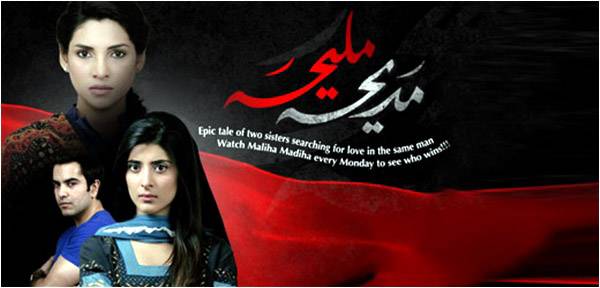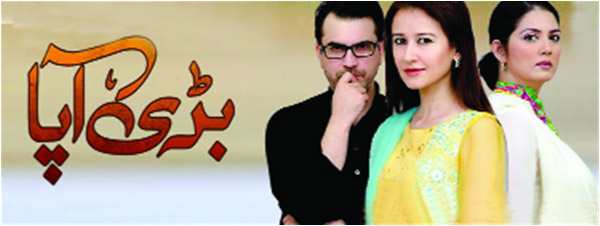
“Kambakht Zindagi bada zalim hai… na mian, na dawat, na bachey, kuch nahin acha lag raha hai...”, remarked my cousin Ainee. She is hooked to Zindagi Channel, India’s current pop cultural obsession. Similar conversations of not wanting to do anything in the evenings apart from watching Pakistani serials abound at various dinner parties. The other night when I called up my eighty year old Khala, she asked me to call her later. She does not take calls between 8 to 11 pm: primetime on Zindagi.
I hate to confess it, but much to the horror of Arman, my twenty-two year old son, I too have become a Zindagi addict. He cannot understand mom’s crossover from a news junkie to serial junkie. I try convincing him to watch the serials with me, enticing him with the possibility of learning the nuances of the Urdu language, but he asks why we can’t read Ghalib instead! Before Zindagi, bedtime Urdu poetry was a ritual. Arman switches off the television and I feel too embarrassed to switch it back on. Years ago, I did the same when he watched television. I am actually relieved when he is out late evenings. Otherwise I have to watch Zindagi repeats in the morning.
Pakistani serials were popular in the late eighties, amongst them ‘Ankahi”, ‘Dhoop Kinare’ and ‘Tanhaiyaan’, that were seen on the old VCRs. Then they disappeared, and with Zindagi are back with a bang.
It is not just Muslim households that are drawn to Zindagi because of ‘ apni zubaan aur apna culture’, just about everyone I know is tuned in, including Anand, my yoga teacher. Instead of discussing the virtues of yogic postures, we discuss Zindagi characters and plots. He says there is no vulgarity in Pakistani serials and they can be seen with families. Fawad Khan’s big hit, Humsafar remains his favourite.
Neelima, a documentary film maker explains the Zindagi success, “The themes and acting are fantastic. I love the dialogues, some of them are so philosophical. Real life is about balancing family relationships and dealing with society. That’s what I appreciate about Pakistan serials. And unlike Indian serials, they are not loud with characters constantly scheming and shouting’.
Viewers appreciate that while Indian soaps go on for years, Zindagi plays have a Final episode. Dramas are shown daily from Monday to Saturday for an hour each, finishing in weeks. Many are trying to learn Urdu with Zindagi which runs an English ticker with ‘ today’s Urdu word’ and its meaning.
The first serial I watched was Maat, the story of two sisters, one leaving her husband and the other getting married to her ex brother-in-law, and bringing up her sister’s son. Eventually he leaves his second wife to marry his first wife again, after she is widowed. It became immensely popular.
But this rivalry amongst sisters, that too over the husband of the other is being repeated too often. In Badi Apa, the strong but oppressive Badi Apa’s meek husband has a secret second wife tucked away. Badi Apa discovers her and gets her to live in the same house, but is unkind to her. Towards the end we discover that Badi Apa holds a torch for her brother-in-law, leaves her husband and expects her brother-in-law to divorce her sister and marry her instead. Woah!

Badi Apa’s family saga over, the story of the two sisters in Madiha Maliha has taken centrestage. The good sister is divorced and the bad sister has ‘trapped’ her brother-in-law into marrying her. My Khala Rabia who has four daughters sounds upset, ‘yeh behnon ko kyoon ladva rahe hain. Aur koi kahaani nahin hai kya’. Khala is still glued to Zindagi though.
Zindagi began with helping break Muslim stereotypes in India, where most don’t really have access to Muslim homes and carry distorted dark pictures of them, particularly of ‘oppressed’ Muslim women. But unfortunately, Zindagi stories are now falling into tired old stereotypes of Muslim men taking on second wives and pronouncing divorce with the controversial triple talaaq, now banned in most Muslim countries.
Questions are being thrown at Muslims. ‘Is talaq really so easy? Can you just send it in a letter like Madiha’s husband? Is cousin marriage so common?’
In almost all the plays, affairs and marriages take place between families, khala, mamoo, taya, chacha, phuphis… Zindagi is getting increasingly incestuous and many are commenting that this must be true of Pakistani society. With repetitive themes and saas bahu elements coming in, I overheard some viewers say they are switching back to Indian soaps. Watch out Zindagi!
I hate to confess it, but much to the horror of Arman, my twenty-two year old son, I too have become a Zindagi addict. He cannot understand mom’s crossover from a news junkie to serial junkie. I try convincing him to watch the serials with me, enticing him with the possibility of learning the nuances of the Urdu language, but he asks why we can’t read Ghalib instead! Before Zindagi, bedtime Urdu poetry was a ritual. Arman switches off the television and I feel too embarrassed to switch it back on. Years ago, I did the same when he watched television. I am actually relieved when he is out late evenings. Otherwise I have to watch Zindagi repeats in the morning.
Pakistani serials were popular in the late eighties, amongst them ‘Ankahi”, ‘Dhoop Kinare’ and ‘Tanhaiyaan’, that were seen on the old VCRs. Then they disappeared, and with Zindagi are back with a bang.
It is not just Muslim households that are drawn to Zindagi because of ‘ apni zubaan aur apna culture’, just about everyone I know is tuned in, including Anand, my yoga teacher. Instead of discussing the virtues of yogic postures, we discuss Zindagi characters and plots. He says there is no vulgarity in Pakistani serials and they can be seen with families. Fawad Khan’s big hit, Humsafar remains his favourite.
Neelima, a documentary film maker explains the Zindagi success, “The themes and acting are fantastic. I love the dialogues, some of them are so philosophical. Real life is about balancing family relationships and dealing with society. That’s what I appreciate about Pakistan serials. And unlike Indian serials, they are not loud with characters constantly scheming and shouting’.
Viewers appreciate that while Indian soaps go on for years, Zindagi plays have a Final episode. Dramas are shown daily from Monday to Saturday for an hour each, finishing in weeks. Many are trying to learn Urdu with Zindagi which runs an English ticker with ‘ today’s Urdu word’ and its meaning.
The first serial I watched was Maat, the story of two sisters, one leaving her husband and the other getting married to her ex brother-in-law, and bringing up her sister’s son. Eventually he leaves his second wife to marry his first wife again, after she is widowed. It became immensely popular.
But this rivalry amongst sisters, that too over the husband of the other is being repeated too often. In Badi Apa, the strong but oppressive Badi Apa’s meek husband has a secret second wife tucked away. Badi Apa discovers her and gets her to live in the same house, but is unkind to her. Towards the end we discover that Badi Apa holds a torch for her brother-in-law, leaves her husband and expects her brother-in-law to divorce her sister and marry her instead. Woah!

Badi Apa’s family saga over, the story of the two sisters in Madiha Maliha has taken centrestage. The good sister is divorced and the bad sister has ‘trapped’ her brother-in-law into marrying her. My Khala Rabia who has four daughters sounds upset, ‘yeh behnon ko kyoon ladva rahe hain. Aur koi kahaani nahin hai kya’. Khala is still glued to Zindagi though.
Zindagi began with helping break Muslim stereotypes in India
Zindagi began with helping break Muslim stereotypes in India, where most don’t really have access to Muslim homes and carry distorted dark pictures of them, particularly of ‘oppressed’ Muslim women. But unfortunately, Zindagi stories are now falling into tired old stereotypes of Muslim men taking on second wives and pronouncing divorce with the controversial triple talaaq, now banned in most Muslim countries.
Questions are being thrown at Muslims. ‘Is talaq really so easy? Can you just send it in a letter like Madiha’s husband? Is cousin marriage so common?’
In almost all the plays, affairs and marriages take place between families, khala, mamoo, taya, chacha, phuphis… Zindagi is getting increasingly incestuous and many are commenting that this must be true of Pakistani society. With repetitive themes and saas bahu elements coming in, I overheard some viewers say they are switching back to Indian soaps. Watch out Zindagi!

